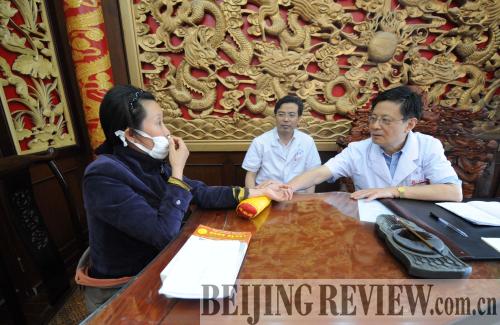|
 |
|
NEW CHALLENGE FOR TRADITIONAL MEDICINE: A patient sees a doctor at a Beijing TCM hospital. TCM injections have caused safety concerns in recent years after patients reported adverse reactions (LI WEN) |
"I don't think it is proper for governments to shut down the factories before they make sure who should shoulder the responsibility," said Li Zhenjiang, Director of the China Shineway Pharmaceutical Group.
Taking action
Many of the injection accidents happened in small town and rural hospitals because of the relatively low level of management. Medical staff in these locations also have less knowledge about how to properly administer TCM injections.
"We support using TCM injections, but their use should be based on knowing how to give them properly," said Mao Zhenbin, an SFDA official.
The China Shineway Pharmaceutical Group has created leaflets instructing how to use TCM injections and handed them out to rural hospitals.
"TCM injections should only be used on patients having an emergency or serious diseases, but some hospitals use them on regular patients. As long as the injections are used properly, it is safe. But now some patients get intravenous injections for the common cold," said Liu.
Information provided by Dongzhimen Hospital shows TCM injection ingredients are very complicated, and should not be used in the same time with Western pharmaceutical injections. They also recommend not using TCM in large doses over a long period. At the same time, storage conditions should be strictly controlled.
TCM injections are supposed to be used under the guidance of professional TCM doctors. Some hospitals ignore this recommendation, said Wang Yaoxian.
There are many small TCM injection manufacturers. There are more than 100 factories across China, for instance, that produce the Yuxingcao injection (specified to treat pneumonia and bacteria infection of the urinary system) and the quality of the product can vary considerably, said Li Xun.
In what is being considered a major reshuffle of the TCM injection market, the SFDA started to reevaluate TCM injections during the first half of 2009 and raised standards throughout every step of the production process. There are six small manufacturers in Hebei Province, for example, that were required to stop production until they qualify to meet the new standards.
"We support raising standards," said Li Zhenjiang of the China Shineway Pharmaceutical Group. "This will help companies avoid lowering prices at the risk of not meeting quality standards, which was often the case in the past."
TCM Injection Accidents
From January 1, 2003, to June 30, 2005, 1,006 adverse reactions were reported after using the Gegen injection (prescribed for heart diseases). Eleven deaths were reported. In November 2004, the SFDA issued a notice to revise the specifications for Gegen injections.
In June 2006, Yuxingcao injection sales were stopped after the SFDA received 5,488 reports of adverse reactions from Yuxingcao injections, with 258 serious cases and 44 deaths.
In 2007, the SFDA released a list of 25 types of TCM injection that have caused serious adverse reactions in patients.
On October 5, 2008, six Yunnan Province patients had serious reactions from a Ciwujia injection that was produced by Wandashan Pharmaceutical Plant in Heilongjiang Province. Three died.
On October 19, 2008, the Ministry of Health announced an emergency notification that four Shaanxi Province infants received serious reactions from a Yinzhihuang injection that was produced by Shanxi Taihang Pharmaceutical Co. Ltd. One of the infants died.
In February 2009, three Qinghai Province patients had reactions to a Shuanghuanglian injection that was produced by Wusuli Pharmaceutical Co. Ltd., which is based in Heilongjiang Province. A 62-year-old female patient died.
(Source: the China Youth Daily)
| 